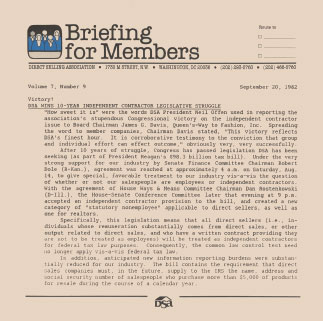1982
Congress Passes the Tax Equity and Fiscal Responsibility Act of 1982 (TEFRA) creating special “statutory nonemployee” status for direct sellers in section 3508 of the tax code.
 From “Briefing for Members” September 20, 1982
From “Briefing for Members” September 20, 1982
DSA Wins 10-Year Independent Contractor Legislative Struggle
“How sweet it is” were the words DSA President Neil Offen used in reporting the association’s stupendous Congressional victory on the independent contractor issue to Board Chairman James G. Davis, Queen’s-Way to Fashion, Inc. Spreading the word to member companies Chairman Davis stated “This victory reflects DSAs finest hour. It is corroborative testimony to the conviction that group and individual effort can effect outcome,” obviously very successfully.
After 10 years of struggle, Congress has passed legislation DSA has been seeking (as part of President Reagan’s $98.3 billion tax bill). Under the very strong support for our industry by Senate Finance Committee Chairman Robert Dole (R-Kan.), agreement was reached at approximately 4 a.m. on Saturday, Aug. 14, to give special, favorable treatment to our industry vis-à-vis the question of whether or not our salespeople are employees or independent contractors. With the agreement of House Ways & Means Committee Chairman Dan Rostenkowski (D-III), the House-Senate Conference Committee later that evening at 9 p.m. accepted an independent contractor provision to the bill, and created a new category of “statutory nonemployee” applicable to direct sellers, as well as one for realtors.
Specifically, this legislation means that all direct sellers (i.e., individuals whose remuneration substantially comes from direct sales, or other output related to direct sales, and who have a written contract providing they are not to be treated as employees) will be treated as independent contractors for federal tax law purposes. Consequently, the common law test need no longer apply vis-à-vis federal tax law.
In addition, anticipated new information reporting burdens were substantially reduced for our industry. The bill contains the requirement that direct sales companies must, in the future, supply to the IRS the names, address and social security number of salespeople who purchase more than $5,000 of products for resale during the course of a calendar year.